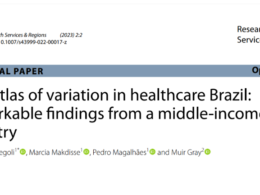“ The doctor of the future will give no medicine,
But will interest his patients in the care of the human frame,
in diet and in cause and prevention of disease.”
Thomas Edison 1902
Medium
Sam Winkworth
Apr 16, 2020
When I first started my career as a health professional 16 years ago studying with experts like Paul Chek, Phil Richards & Dax Moy along the way, the continuing underlying message was that sickness & disease can be prevented.
And that if we look towards building health on a cellular level then countless medical conditions such as type II diabetes, certain cancers, heart disease, and obesity could all be prevented.
Nearly 2 decades later, and having helped thousands of men & women with their mental & physical health along the way, I’m still of this opinion.
In this article I’d like to address the fundamental differences between sick care and health care, so that hopefully by the end of it you’ll have a clearer picture & better understanding when deciding for yourself which model you’d like to be in when it comes to looking after your own health.

What is sick care?
Sick care can be defined as damage control. It’s reactively managing sickness, illness & disease through drugs, medicine & vaccinations.
I’m a big advocate of medicine. When it’s administered in emergency situations like accidents, traumas, surgery and other life or death situations then great.
^^ This is a no brainer.
The main goal of sick care is to prevent you from getting any worse. It’s also to help get you better again quickly which is great, however you’ll find rarely does sick care look at correcting out what’s causing the problem in the first place.
The sick care model’s primary focus is to treat the symptom of an illness or condition without addressing the underlying cause.
Benefits
- Can relieve pain & suffering
- Identifying/treating symptoms can be useful in the event of working out the cause
- Serves a vital purpose for emergency events.
Pitfalls
- Waits until we become ill before it kicks in
- Promotion around building good cellular health & education on preventable strategies is limited
- Encourages reliance on system
Here is who can help you with sick care:
- GP’s
- Hospitals
- Chemists

What is healthcare?
Health care can be defined as wellness. It’s disease prevention and strategies that help move you further towards health & immunity that prevent problems from happening in the first place.
These include things like nutrition, sleep, positive mental state, stress management & exercise.
Benefits
- Proactively creating true health on a cellular level & disease prevention
- Lesser burden on NHS & GP’s
- Encourages self-reliance
Pitfalls
- Drop out rate is high due to lack of accountability & support
- Stressful busy lifestyles can often make regular exercise hard to sustain
- More promotion & evidence is needed that nutrition & lifestyle can prevent & reverse disease
Here’s who can help you with health care:
- Dieticians/nutritionists
- Naturopathic doctors
- Personal trainers/ fitness trainers
- Meditation experts
Both sick care and health care have their role to play however both models are very different so the two terms shouldn’t be misused or confused with one another.
Sick care treats the symptoms Health care treats the cause
Please also consider these statistics that are currently published on the healthfact.org. website:
“Total health spending in England was around £129 billion in 2018/19 and is expected to rise to nearly £134 billion by 2019/20, taking inflation into account. In 2018/19 around £115 billion was spent on the NHS England budget.”
Also consider that disease, mental health & obesity is massively on the increase in the UK too.
Infact, heart disease, stroke, cancer, & mental health statistics make for startling reading right now:
- There are 167,000 heart disease deaths in the U.K. each year. 7.4 million people are estimated to be currently living with a heart or circulatory disease [1]
- There are more than 100,000 strokes in the UK each year; [2] of which 38,000 are fatal
- There are 367,000 new cancer cases in the U.K. each year. This is projected to rise by more than 40% to around 514,000 new cases per year in 2035 [3]
- Every day nearly 990 people are diagnosed with cancer, and around 450 people die from the disease. Incidence rates have increased by 12% since the early 1990s [4]
- Approximately 1 in 4 people in the UK will experience a mental health problem each year [5]
- 28.7% of adults in England are obese. A further 35.6% are overweight. Poor diet and low levels of physical activity are the primary causal factors to excess weight. [6]
^^ Just let all those numbers sink in for a moment.
Our NHS does an amazing job caring for the sick but it’s at crisis point. And has been for quite some time.
Now is the time.
We need to protect our NHS.
More help is needed spreading the health word.
We are the sickest and fattest that we’ve ever been in any point in our history.
Let’s SUPPORT our NHS by not overburdening it.
Is our sick care system working?
Is it making people healthier?
You be the judge.
Personally I am of the strong opinion that more education is needed on proven strategies that we already know help curb diseaselike stress management, nutrition, clean drinking water exercise & optimum sunshine.
Ultimately it’s up to you which model you feel is going to serve you and your family the best in the long run when it comes to true health.
Whatever you decide, I wish you all the best with your health journey
Stay strong,
Sam Winkworth
References
[1] British Heart Foundation. U.K. Factsheet (January 2020). Retrieved online 4/14/20 https://www.bhf.org.uk/-/media/files/research/heart-statistics/bhf-cvd-statistics-uk-factsheet.pdf? [2] Stroke Association (2017). State of the Nation Stroke Statistics. Retrieved online 4/14/20 https://www.stroke.org.uk/sites/default/files/state_of_the_nation_2017_final_1.pdf [3] Cancer Research U.K. Cancer statistics for the U.K. Retrieved online 4/14/20 https://www.cancerresearchuk.org/health-professional/cancer-statistics-for-the-uk [4] Cancer in the U.K. https://www.cancerresearchuk.org/sites/default/files/state_of_the_nation_april_2019.pdf [5] McManus, S., Meltzer, H., Brugha, T. S., Bebbington, P. E., & Jenkins, R. (2009). Adult psychiatric morbidity in England, 2007: results of a household survey. The NHS Information Centre for health and social care [6] House of Commons library — Obesity statistics (2019). Retrieved online 4/10/20 https://commonslibrary.parliament.uk/research-briefings/sn03336/Originally published at https://medium.com on April 16, 2020.












